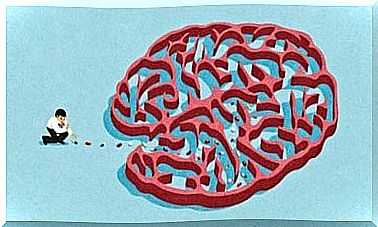Excessive Fatigue (hypersomnia)

It is estimated that about 4-6% of the population suffers from hypersomnia or excessive fatigue. It is a common problem that often goes unrecognized, especially by those affected by it.
People usually confuse it with fatigue and ordinary tiredness, but it can have many causes. Therefore, a professional assessment is the best way to get an accurate diagnosis.
The consequences are significant, although many people have normalized the presence of this excessive sleepiness in their lives. However, it often leads to a decrease in concentration and the ability to remember things.
In addition, it causes mood swings and greatly hinders daily activities. Read on to learn more about this neurological condition and its possible causes.

What is Excessive Fatigue or Hypersomnia?
Hypersomnia is also known as excessive daytime fatigue. This is a physiological condition that makes people inexplicably sleepy during the day. The person thus experiences a subjective numbness during the day and it hinders normal functioning. A doctor cannot diagnose hypersomnia until symptoms have been present daily for at least three months.
It is not always easy to determine what is going on. Some people think they are extremely tired and have no idea why. However, to facilitate the detection of hypersomnia, you should consider how sleepy you feel in situations such as:
- watching television
- traveling as a passenger in a car on one-hour journeys
- sitting in a public place such as a movie theater or conference hall
- reading a book
- rest while sitting after dinner
If you are very tired in most of these situations, then it is very possible that you have this problem. However, the causes vary and can vary significantly from person to person. So it is important to find out the cause in order to remedy and mitigate the effects.
What causes fatigue?
Too little sleep or poor quality sleep
In order to function well during the day, people need to sleep well at night. When someone suffers from chronic insomnia, the sleep deprivation takes its toll. For example, hypersomnia occurs in people who sleep only five or fewer hours each night for a significant period of time.
This can be the result of insomnia or a lifestyle in which a person limits their sleep hours for work or social reasons. This makes it difficult for them to get up in the morning. In fact, they may experience sudden bouts of sleepiness during the day.
If you interrupt or fragment your nighttime sleep, it will be anything but restorative. People with insomnia, restless legs or breathing disorders wake up at different times during the night. As a result, the quality of their sleep decreases and hypersomnia develops.

Primary Sleep Disorders
There are several conditions in which hypersomnia is one of the main symptoms. Narcolepsy, for example, usually starts with excessive daytime sleepiness. Then other symptoms appear, such as cataplexy, sleep paralysis and hypnagogic hallucinations.
Conditions such as idiopathic hypersomnia or Kleine Levin syndrome also occur with this symptom. With them there is a significant increase in the total number of hours of sleep, as well as a more or less irresistible tendency to sleep during the day.
Other causes
Among the many causes of excessive daytime sleepiness are encephalopathies, trauma and dementia. It can even be a symptom of major depressive episodes or due to the use of certain drugs.
In short, it is a common symptom of various organic, neurological and psychiatric disorders. Its presence makes it difficult for those who suffer from it to lead functional and fulfilling lives, as it affects their cognitive functions and emotional state.
You should see a doctor if you think you, or someone close to you, could be in this situation. In some cases, this symptom alerts you to the presence of other conditions that require intervention. And in other cases, it’s just an invitation to be more considerate of your sleep needs.









